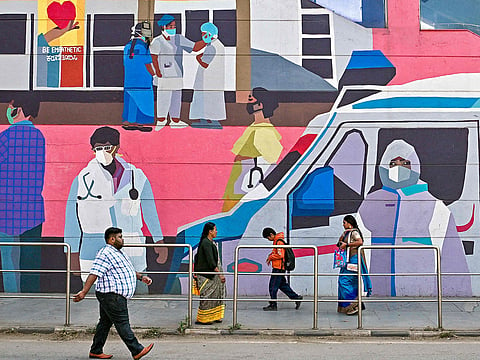Focus on prevention, don’t panic, say experts as India reports Metapneumovirus cases
None of the affected families has travel histories, suggesting local transmission

Dubai: India has reported its first confirmed cases of Human Metapneumovirus (HMPV), a respiratory virus that has circulated globally for years.
The cases include a 3-month-old baby in Bengaluru, who has been discharged, an 8-month-old child recovering in the city, and a 2-month-old infant in Ahmedabad.
None of the affected families has travel histories, suggesting local transmission.
HMPV, discovered in 2001, causes respiratory illnesses ranging from mild cold-like symptoms to severe complications, particularly in infants, older adults, and individuals with weakened immune systems. While most cases are mild, the virus can occasionally lead to pneumonia or exacerbate chronic respiratory conditions.
The Ahmedabad infant, initially on a ventilator, is now stable. “HMPV was detected in the patient on December 26, but the case was reported to us only recently,” said Dr. Bhavin Solanki, Chief Medical Officer of the Ahmedabad Municipal Corporation.
Government reassures public
India’s Health Ministry has convened a meeting to discuss HMPV preparedness. The Indian Council of Medical Research (ICMR) emphasized that HMPV is not a new pathogen and has been circulating in India and worldwide.
How to protect yourself?
Dos
Cover mouth and nose with a handkerchief or tissue paper when coughing or sneezing
Wash hands frequently with soap, water, or alcohol-based sanitiser
Stay away from public places if anyone has a fever, cough, or sneeze
Drink plenty of water and eat a nutritious diet
Maintain adequate ventilation in all areas to reduce infection.
Don’ts
Avoid Handshake, tissue paper and handkerchief recycling, close contact with sick people, frequent touching of eyes, nose and mouth, spitting in public places, and medicines without doctor’s advice.
Currently, there is no specific antiviral medication or vaccine available for HMPV.
Treatment is supportive and depends on the severity of the infection. For mild cases, rest, adequate hydration and over-the-counter medications to manage fever and nasal congestion are sufficient.
“There is no unusual surge in respiratory illnesses,” an ICMR spokesperson said, adding that the existing surveillance systems are closely monitoring the situation.
Federal Health Minister JP Nadda said: “Health experts have clarified that HMPV is not a new virus. It was first identified in 2001 and it has been circulating in the entire world since many years.”
“HMPV spreads through air, by way of respiration. This can affect persons of all age groups. The virus spreads more during the winter and the early spring months. On recent reports, the cases of HMPV in China, the Health Ministry, the ICMR and the National Centre for Disease Control are keeping a close watch on the situation in China as well as in the neighbouring countries. WHO has taken cognisance of the situation and will share its report shortly with us,” he said.
Nothing new
Karnataka Health Minister Dinesh Gundu Rao assured the public that the HMPV is an existing flu virus causing respiratory issues and is not a cause for panic, adding that the child exhibiting HMPV symptoms is stable and will be discharged soon. There is no emergency as of now. People should stay calm.
“This is not something which is unknown or new. HMPV is a flu virus and certain people catch respiratory problems and colds due to this virus.”
“He further added that the child with HMPV symptoms is normal and he will be discharged tomorrow. There is no need to panic. We are having a meeting with our panel and we will further discuss this with GoI, ICMR. These are regular symptoms. This is an existing virus. As of now, it is not a serious issue. Whether it is connected to China or not, we do not know. The child with HMPV symptoms has no history of travelling abroad. There is no emergency as of now. People should stay calm.”
Experts agree. “Human Metapneumovirus is like any other respiratory virus that causes the common cold. Most Indians have developed immunity against it,” said Dr. Harshal Salve, Additional Professor at AIIMS, New Delhi.
Enhanced surveillance and precautions
India’s government has ramped up laboratory capacity for HMPV testing and instructed hospitals to enhance isolation protocols for suspected cases. Hospitals are also required to report Influenza-Like Illness (ILI) and Severe Acute Respiratory Infections (SARI) cases via the Integrated Health Information Platform (IHIP).
The ICMR continues its nationwide surveillance of respiratory illnesses, including HMPV, influenza, and Respiratory Syncytial Virus (RSV), as part of its routine monitoring efforts.
For mild cases, supportive care such as rest, hydration, and over-the-counter medications is sufficient. Severe cases may require hospital-based care, though such instances are rare.
Global and local context
The federal government is also monitoring respiratory illnesses reported in other countries, including an uptick in China linked to HMPV, RSV, and influenza. However, Indian health officials maintain that current surveillance data show no similar trends within the country.
Respiratory viruses like HMPV often peak during winter and early spring. Despite public concerns about another pandemic or potential lockdowns, health authorities stress that HMPV is not a novel threat.
Final word
“There’s no need to panic,” reiterated Dr. Atul Goel of the Directorate General of Health Services. “HMPV has been part of the circulating flu viruses for years. Basic precautions are enough to mitigate risks.”
The Health Ministry has called for continued vigilance while reassuring the public that India’s health systems are equipped to handle respiratory illnesses effectively.
Sign up for the Daily Briefing
Get the latest news and updates straight to your inbox



